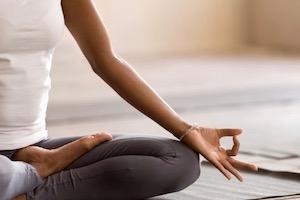Student Life
Coping Tips from AU Health Promotion Students AU students offers research-based advice to their peers

In our new world of social distancing, quarantines, isolation, and 24/7 pandemic news, it is natural to experience elevated feelings of stress, anxiety, and worry, says a group of AU Health Promotion ’20 students: Vela McBride, Gabriela Rodriguez, Elizabeth Hernandez, Eva Herron, Swezen Kizito, and Joseph Shiffert.
For their senior seminar class, taught by Stacey Snelling, professor and chair of AU’s Department of Health Studies, this group of students researched strategies for promoting mental health during this difficult and uncertain time. They share them here, in their own words.
Six Things You Can Control
If you’re sitting on your couch in the same clothes you put on three days ago and thinking about the iced coffee you should be enjoying with your friends on the quad, we’re right there with you. As American University seniors, we are feeling the magnitude of this transition as deeply as the rest of the AU community, and we are here to remind you that you are not alone.
Because this is such an unprecedented time, there is no one guide for how to exist right now. However you are choosing to move forward with your life amidst all the uncertainty is valid. But, as students studying health promotion, we hope to pass on some of the valuable practices we have acquired through our studies in hopes you will use them to restore some normalcy to your days.
Right now, we can’t control much in our lives. However, here we offer you six things that you do have control over.
Get Fresh Air Every Day
Even if you’re outdoors for only five minutes, the fresh air will remind you that there is still a world outside the four walls you’re contained in, and that you will get to return to it as soon as this is over.
Set a Few Small Goals for the Day
It doesn't matter how small. It can be as simple as getting out of pajamas each day and putting on your favorite pair of pants—or peeling a whole orange in one go. These little things will give you a sense of accomplishment and make you feel more productive.
Shift the Narrative of Loss
There is no question that many things have come to a premature end, and it is incredibly difficult to move forward without the goodbyes and closure we deserved. As much as we have to allow ourselves time to process the losses, we also have to find ways to look forward and get excited about new opportunities. Gratitude statements are a fantastic way to shift your thinking from “missing” to “enough.”
Separate Your Study and Relaxation Spaces
We cannot stress this enough. Differentiating your bed from your workspace can make all the difference. Set up your own library-cubicle equivalent somewhere in your living space and save your room for down time (which you deserve).
Communicate Your Needs and Feelings
It is imperative that we do not undermine our feelings and that we honor ourselves by setting boundaries with our friends and loved ones. We are college students with demanding schedules, and this has not changed with the move to online classes. Let the people you are sharing space with know your schedule and times that you expect a peaceful environment in order to give yourself the best chance to continue excelling academically.
Exercise!
It’s proven. Exercise boosts mood, manages stress, and improves overall mental health. However, since most gyms have been shut down, it takes some more creativity to create a workout plan. One excellent type of exercise that anyone can do, even while in quarantine, is circuit training, a form of resistance training or body conditioning that cycles you through several exercises. An exercise circuit is one completed round of an established set of exercises. Body weight circuit training requires little to no equipment, and it is perfect for situations where access to gym equipment is limited. Body-weight circuit training can be done anywhere by anyone. Training sessions can be as short or as long as needed or desired, and intensity can be raised or lowered based on desired effectiveness. Exercises might include jumping jacks, push-ups, high-knees, squats, lunges, crunches, planks, or burpees.
Circuit training can be done anywhere, but you can also walk or run, do yoga, or lift weights. The most important part is that you are finding ways to take care of your health.
A Sense of Community
This moment in time might seem isolating, but at the end of the day you are part of a larger community filled with people who are experiencing many of the same feelings that you are. We hope these tips make your days a little brighter and in some small way remind you that although there is no specific timeline, this too shall pass.
